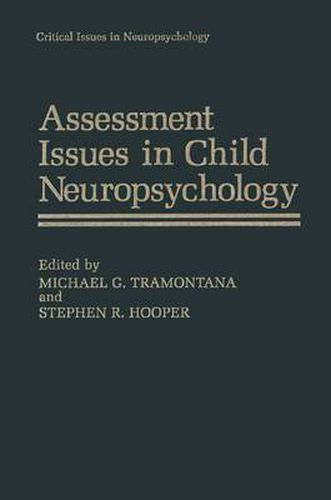Readings Newsletter
Become a Readings Member to make your shopping experience even easier.
Sign in or sign up for free!
You’re not far away from qualifying for FREE standard shipping within Australia
You’ve qualified for FREE standard shipping within Australia
The cart is loading…






This title is printed to order. This book may have been self-published. If so, we cannot guarantee the quality of the content. In the main most books will have gone through the editing process however some may not. We therefore suggest that you be aware of this before ordering this book. If in doubt check either the author or publisher’s details as we are unable to accept any returns unless they are faulty. Please contact us if you have any questions.
Neuropsychology has its roots in clinical neurology. Reading case de scriptions by 19th century neurologists, such as Wernicke’s painstakingly detailed examinations of patients with the aphasic symptom-complex, makes it obvious that neuropsychology is not a new discipline. Even the marriage with psychology is not new; the neurologist Arnold Pick, for example, was fully conversant with the developments in contemporary psychological as well as linguistic research. However, the primary focus of 19th and early 20th century psychology was on general psychology, and only a small number of psychologists ventured into what then was called differential psychology (the psychology of individual dif ferences) including a few who became attached to neurological research and rehabilitation units after World War I. It remained until World War II for psychologists to establish a more solid working relationship with neurology. What psychology had to offer to neurology was its experimental skill, the development of a sophisticated methodology, and, for clinical work, the development of psychometrics. On the whole, the marriage between the two disciplines has been fruitful, leading to new insights, models, and discoveries about brain-behavior relationships, documented in several textbooks which appeared in rapid succession since the 1960s. In clinical practice, neuropsychology has been inventive in some respects, in others merely introducing psychometric rigor to already existing neurological examinations. As described in greater detail in this book, developmental neuropsy chology is of even more recent origin.
$9.00 standard shipping within Australia
FREE standard shipping within Australia for orders over $100.00
Express & International shipping calculated at checkout
This title is printed to order. This book may have been self-published. If so, we cannot guarantee the quality of the content. In the main most books will have gone through the editing process however some may not. We therefore suggest that you be aware of this before ordering this book. If in doubt check either the author or publisher’s details as we are unable to accept any returns unless they are faulty. Please contact us if you have any questions.
Neuropsychology has its roots in clinical neurology. Reading case de scriptions by 19th century neurologists, such as Wernicke’s painstakingly detailed examinations of patients with the aphasic symptom-complex, makes it obvious that neuropsychology is not a new discipline. Even the marriage with psychology is not new; the neurologist Arnold Pick, for example, was fully conversant with the developments in contemporary psychological as well as linguistic research. However, the primary focus of 19th and early 20th century psychology was on general psychology, and only a small number of psychologists ventured into what then was called differential psychology (the psychology of individual dif ferences) including a few who became attached to neurological research and rehabilitation units after World War I. It remained until World War II for psychologists to establish a more solid working relationship with neurology. What psychology had to offer to neurology was its experimental skill, the development of a sophisticated methodology, and, for clinical work, the development of psychometrics. On the whole, the marriage between the two disciplines has been fruitful, leading to new insights, models, and discoveries about brain-behavior relationships, documented in several textbooks which appeared in rapid succession since the 1960s. In clinical practice, neuropsychology has been inventive in some respects, in others merely introducing psychometric rigor to already existing neurological examinations. As described in greater detail in this book, developmental neuropsy chology is of even more recent origin.